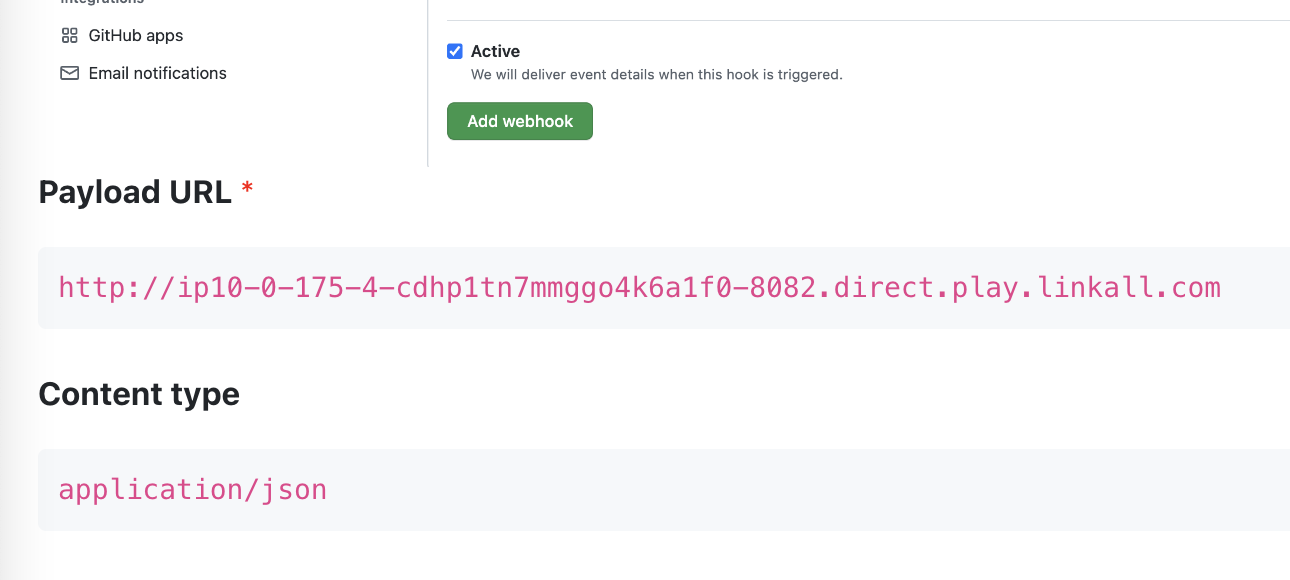GitHub Source
Introduction
The GitHub Source is a Vanus Connector which aims to retrieve GitHub webhook events and transform them into CloudEvents based on the CloudEvents Adapter specification by wrapping the body of the original request into the data field.
An original GitHub webhook event looks like:
{
"action": "created",
"starred_at": "2022-07-21T06:28:23Z",
"repository": {
"id": 513353059,
"node_id": "R_kgDOHpklYw",
"name": "test-repo",
"full_name": "XXXX/test-repo",
"private": false,
"owner": {
"login": "XXXX",
"type": "User",
"site_admin": false
},
"visibility": "public",
"forks": 0,
"open_issues": 2,
"watchers": 1,
"default_branch": "main"
},
"sender": {
"login": "XXXX",
"id": 75800782,
"node_id": "MDQ6VXNlcjc1ODAwNzgy",
"avatar_url": "https://avatars.githubusercontent.com/u/75800782?v=4",
"gravatar_id": "",
"url": "https://api.github.com/users/XXXX",
"html_url": "https://github.com/XXXX",
"followers_url": "https://api.github.com/users/XXXX/followers",
"following_url": "https://api.github.com/users/XXXX/following{/other_user}",
"gists_url": "https://api.github.com/users/XXXX/gists{/gist_id}",
"starred_url": "https://api.github.com/users/XXXX/starred{/owner}{/repo}",
"subscriptions_url": "https://api.github.com/users/XXXX/subscriptions",
"organizations_url": "https://api.github.com/users/XXXX/orgs",
"repos_url": "https://api.github.com/users/XXXX/repos",
"events_url": "https://api.github.com/users/XXXX/events{/privacy}",
"received_events_url": "https://api.github.com/users/XXXX/received_events",
"type": "User",
"site_admin": false
}
}
which is converted to
{
"id": "4ef226c0-08c7-11ed-998d-93772adf8abb",
"source": "https://api.github.com/repos/XXXX/test-repo",
"type": "com.github.watch.started",
"datacontenttype": "application/json",
"time": "2022-07-21T07:32:44.190Z",
"data": {
"action": "created"
}
}
Quick Start
This section will teach you how to use GitHub Source to convert events from GitHub webhook into CloudEvents.
Prerequisites
- Have a container runtime (i.e., docker).
- Have a GitHub Repository.
Create the config file
cat << EOF > config.yml
target: http://localhost:31081
port: 8082
github:
webhook_secret: ""
EOF
| Name | Required | Default | Description |
|---|---|---|---|
| target | YES | the target URL to send CloudEvents | |
| port | YES | 8080 | the port to receive GitHub webhook event |
| github.webhook_secret | NO | the GitHub webhook secret |
The GitHub Source tries to find the config file at /vanus-connect/config/config.yml by default. You can specify the
position of config file by setting the environment variable CONNECTOR_CONFIG for your connector.
Start with Docker
docker run -it --rm --network=host \
-v ${PWD}:/vanus-connect/config \
--name source-github public.ecr.aws/vanus/connector/source-github
Test
We have designed for you a sandbox environment, removing the need to use your local machine. You can run Connectors directly and safely on the Playground.
We've already exposed the GitHub Source to the internet if you're using the Playground. Go to GitHub-Twitter Scenario under Payload URL.

Create a GitHub webhook for your repository.
- Create a webhook under the Settings tab inside your GitHub repository.
- Set the configuration for your webhook.
Open a terminal and use the following command to run a Display sink, which receives and prints CloudEvents.
docker run -it --rm \
-p 31081:8080 \
--name sink-display public.ecr.aws/vanus/connector/sink-display
Make sure the target value in your config file is http://localhost:31081 so that the Source can send CloudEvents to
our Display Sink.
After running Display Sink, run the Github Source
docker run -it --rm --network=host \
-v ${PWD}:/vanus-connect/config \
--name source-github public.ecr.aws/vanus/connector/source-github
- Star your GitHub repository.
Here is the sort of CloudEvent you should expect to receive in the Display Sink:
{
"id": "4ef226c0-08c7-11ed-998d-93772adf8abb",
"source": "https://api.github.com/repos/XXXX/test-repo",
"type": "com.github.star.started",
"datacontenttype": "application/json",
"time": "2022-07-21T07:32:44.190Z",
"data": {
"action": "created"
}
}
Clean
docker stop source-github sink-display
Run in Kubernetes
kubectl apply -f source-github.yaml
apiVersion: v1
kind: Service
metadata:
name: source-github
namespace: vanus
spec:
selector:
app: source-github
type: ClusterIP
ports:
- port: 8080
name: source-github
---
apiVersion: v1
kind: ConfigMap
metadata:
name: source-github
namespace: vanus
data:
config.yml: |-
target: "http://vanus-gateway.vanus:8080/gateway/quick_start"
port: 8080
github:
webhook_secret: ""
---
apiVersion: apps/v1
kind: Deployment
metadata:
name: source-github
namespace: vanus
labels:
app: source-github
spec:
selector:
matchLabels:
app: source-github
replicas: 1
template:
metadata:
labels:
app: source-github
spec:
containers:
- name: source-github
image: public.ecr.aws/vanus/connector/source-github
imagePullPolicy: Always
ports:
- containerPort: 8080
name: github
volumeMounts:
- name: source-github-config
mountPath: /vanus-connect/config
volumes:
- name: source-github-config
configMap:
name: source-github
Integrate with Vanus
This section shows how a source connector can send CloudEvents to a running Vanus cluster.
Prerequisites
- Have a running K8s cluster
- Have a running Vanus cluster
- Vsctl Installed
- Export the VANUS_GATEWAY environment variable (the ip should be a host-accessible address of the vanus-gateway service)
export VANUS_GATEWAY=192.168.49.2:30001
- Create an eventbus
vsctl eventbus create --name quick-start
- Update the target config of the GitHub Source
target: http://192.168.49.2:30001/gateway/quick-start
- Run the GitHub Source
docker run --network=host \
--rm \
-v ${PWD}:/vanus-connect/config \
--name source-github public.ecr.aws/vanus/connector/source-github